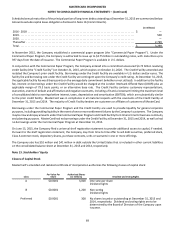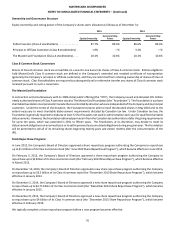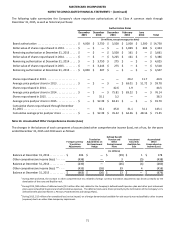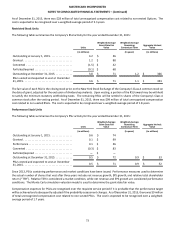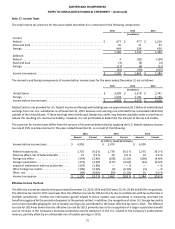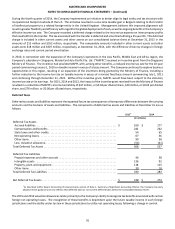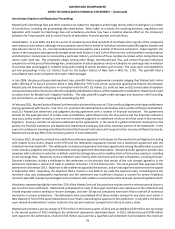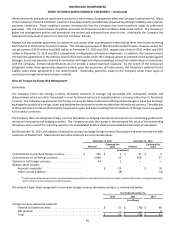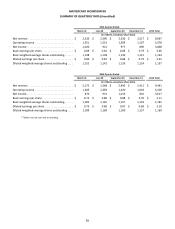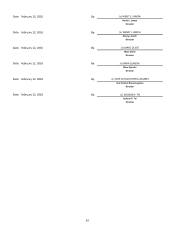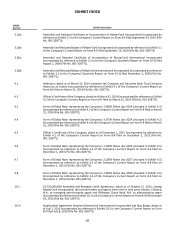MasterCard 2015 Annual Report Download - page 84
Download and view the complete annual report
Please find page 84 of the 2015 MasterCard annual report below. You can navigate through the pages in the report by either clicking on the pages listed below, or by using the keyword search tool below to find specific information within the annual report.MASTERCARD INCORPORATED
NOTES TO CONSOLIDATED FINANCIAL STATEMENTS – (Continued)
78
Interchange Litigation and Regulatory Proceedings
MasterCard’s interchange fees and other practices are subject to regulatory and/or legal review and/or challenges in a number
of jurisdictions, including the proceedings described below. When taken as a whole, the resulting decisions, regulations and
legislation with respect to interchange fees and acceptance practices may have a material adverse effect on the Company’s
prospects for future growth and its overall results of operations, financial position and cash flows.
United States. In June 2005, the first of a series of complaints were filed on behalf of merchants (the majority of the complaints
were styled as class actions, although a few complaints were filed on behalf of individual merchant plaintiffs) against MasterCard
International, Visa U.S.A., Inc., Visa International Service Association and a number of financial institutions. Taken together, the
claims in the complaints were generally brought under both Sections 1 and 2 of the Sherman Act, which prohibit monopolization
and attempts or conspiracies to monopolize a particular industry, and some of these complaints contain unfair competition law
claims under state law. The complaints allege, among other things, that MasterCard, Visa, and certain financial institutions
conspired to set the price of interchange fees, enacted point of sale acceptance rules (including the no surcharge rule) in violation
of antitrust laws and engaged in unlawful tying and bundling of certain products and services. The cases were consolidated for
pre-trial proceedings in the U.S. District Court for the Eastern District of New York in MDL No. 1720. The plaintiffs filed a
consolidated class action complaint that seeks treble damages.
In July 2006, the group of purported merchant class plaintiffs filed a supplemental complaint alleging that MasterCard’s initial
public offering of its Class A Common Stock in May 2006 (the “IPO”) and certain purported agreements entered into between
MasterCard and financial institutions in connection with the IPO: (1) violate U.S. antitrust laws and (2) constituted a fraudulent
conveyance because the financial institutions allegedly attempted to release, without adequate consideration, MasterCard’s right
to assess them for MasterCard’s litigation liabilities. The class plaintiffs sought treble damages and injunctive relief including,
but not limited to, an order reversing and unwinding the IPO.
In February 2011, MasterCard and MasterCard International entered into each of: (1) an omnibus judgment sharing and settlement
sharing agreement with Visa Inc., Visa U.S.A. Inc. and Visa International Service Association and a number of financial institutions;
and (2) a MasterCard settlement and judgment sharing agreement with a number of financial institutions. The agreements
provide for the apportionment of certain costs and liabilities which MasterCard, the Visa parties and the financial institutions
may incur, jointly and/or severally, in the event of an adverse judgment or settlement of one or all of the cases in the merchant
litigations. Among a number of scenarios addressed by the agreements, in the event of a global settlement involving the Visa
parties, the financial institutions and MasterCard, MasterCard would pay 12% of the monetary portion of the settlement. In the
event of a settlement involving only MasterCard and the financial institutions with respect to their issuance of MasterCard cards,
MasterCard would pay 36% of the monetary portion of such settlement.
In October 2012, the parties entered into a definitive settlement agreement with respect to the merchant class litigation (including
with respect to the claims related to the IPO) and the defendants separately entered into a settlement agreement with the
individual merchant plaintiffs. The settlements included cash payments that were apportioned among the defendants pursuant
to the omnibus judgment sharing and settlement sharing agreement described above. MasterCard also agreed to provide class
members with a short-term reduction in default credit interchange rates and to modify certain of its business practices, including
its No Surcharge Rule. Objections to the settlement were filed by both merchants and certain competitors, including Discover.
Discover’s objections include a challenge to the settlement on the grounds that certain of the rule changes agreed to in the
settlement constitute a restraint of trade in violation of Section 1 of the Sherman Act. The court granted final approval of the
settlement in December 2013. Objectors to the settlement appealed the decision, and an oral argument was heard on the appeal
in September 2015. Separately, the objectors filed a motion in July 2015 to set aside the approval order, contending that the
merchant class was inadequately represented and the settlement was insufficient because a counsel for several individual
merchant plaintiffs improperly exchanged communications with a defense counsel who at the time was representing MasterCard.
Merchants representing slightly more than 25% of the MasterCard and Visa purchase volume over the relevant period chose to
opt out of the class settlement. MasterCard anticipates that most of the larger merchants who opted out of the settlement will
initiate separate actions seeking to recover damages, and over 30 opt-out complaints have been filed on behalf of numerous
merchants in various jurisdictions. The defendants have consolidated all of these matters (except for one state court action in
New Mexico) in front of the same federal district court that is overseeing the approval of the settlement. In July 2014, the district
court denied the defendants’ motion to dismiss the opt-out merchant complaints for failure to state a claim.
MasterCard recorded a pre-tax charge of $770 million in the fourth quarter of 2011 and an additional $20 million pre-tax charge
in the second quarter of 2012 relating to the settlement agreements described above. In 2012, MasterCard paid $790 million
with respect to the settlements, of which $726 million was paid into a qualified cash settlement fund related to the merchant



